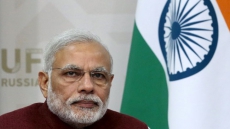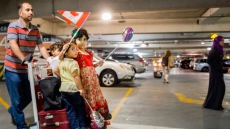TORONTO — When Martin Hinrichs-Pymm was in intensive care last fall after having part of his liver removed to donate to his critically ill mother, there was one thing he wanted most: to have the rest of his family and friends around him as often as they could visit, no matter the time of day.
Hinrichs-Pymm was lucky. He was in Toronto General Hospital, one of the health-care centres in Canada that has instituted a more open-door policy for visitors, based on the idea that loved ones can help make patients feel more supported during a vulnerable time in their lives.
"It was good because my family was always there. Every day they came and I just wanted to see more of them," the 19-year-old said of his father and brother.
The budding opera singer had postponed his first year of studying classical voice performance at Laurier University in Waterloo, Ont., to provide a life-saving transplant for his mother Annette, who had end-stage liver disease due to a condition called primary sclerosing cholangitis, or PSC.
Lying in a hospital bed in pain and with limited movement, Hinrichs-Pymm was unable to physically visit his mother, who was recovering in an ICU room down the hall, though they were able to communicate periodically by Skype when the hospital Wi-Fi was working.
He also felt too ill and doped up on painkillers to read or study — so having family and friends by his bedside helped keep him from sliding into a major post-surgical depression.
"I was lonely," he recalled Monday from Waterloo, where the baritone started his music studies in September. "The fact that people were coming, it made my day.
"That's all I wanted. I wanted to talk to someone."
Every patient in hospital should be able to have family members and friends spend time by their side, says the Canadian Foundation for Healthcare Improvement (CFHI), which is calling on all hospitals, long-term care homes and other health-care facilities to expand access for visitors.
The national, federally funded organization has launched a campaign called Better Together: Partnering with Families, to encourage hospitals to adopt more patient- and family-centred policies regarding visiting hours.
"It's not about abolishing visiting hours, per se. There are practical reasons why hospitals have visiting hours," said Stephen Samis, CFHI's vice-president of programs.
"The real issue here is if I want a family member or loved one with me there in the hospital and it's outside of visiting hours, they're able to be there," he said from Ottawa. "And to a certain extent, they become a different set of eyes and ears for the patient as well."
Samis said research has shown that patients who have loved ones around them during a hospital stay have better care, experience fewer medication errors and falls, and have lower rates of re-admission and ER visits following discharge.
"You have a significant decrease in patient and family anxiety," he said. "People who want to have someone there, it's very comforting for them to know that that person is there and vice versa for the family members.
"And there's also really good evidence that it creates an improved culture in the organization, and often the staff really come to appreciate the family presence as well."
In a recent CFHI study of 114 acute-care hospitals across Canada, only 30 of the health-care institutions received top marks for having more patient-centred visiting policies.
The organization would like to see all hospitals in Canada adopt policies that are more welcoming to family and friends, in a bid to maximize patient care. The group is offering resources on its website — http://www.cfhi-fcass.ca/ — to help hospitals and other health-care institutions make changes to their visiting-hour policies.
Hospitals, regional health authorities and long-term care facilities are also encouraged to sign the Better Together pledge on the CFHI website, said Samis.
"We just see this as a very practical step in which our hospitals can begin to demonstrate their commitment to patients and family-centred care."
University Health Network, which is comprised of Toronto General and three other large teaching hospitals in Toronto, is among the Canadian institutions that have changed their policies to be more family inclusive.
About 18 months ago, the organization started working on a more open policy for visitors, said UHN patient ombudsman Sharon Rogers.
"When a person is sick and they're in hospital and they're not feeling well, they really want to have their family around them to offer them support and comfort and to be an extra pair of ears — and just not to be lonely," said Rogers, who co-wrote the new policy.
"It makes the experience a little easier for a person who has to be in hospital."
The more open-door policy applies to all patient wards in the hospitals, including the ICU — although there may be situations in which visits may be limited, for instance if several emergency codes are being called at once or there's an outbreak of an infectious disease that could put patients at risk.
She said loved ones are also asked to be reasonable, for example, not arriving in the middle of the night and disturbing other patients.
"The policy basically says that we recognize the importance of family to patients and we also recognize that the definition of family may be different for different people. And it's the patient who will decide who her family is," said Rogers.
"It also says that we recognize that family members aren't visitors — they're part of the family — and you don't have to make an appointment with your family."





